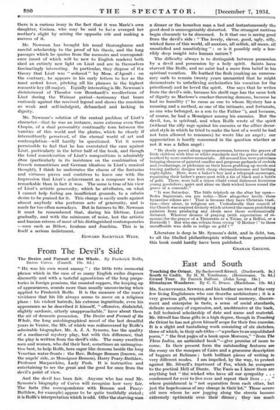From The Devil's Side
" HE was his own worst enemy " : the little trite memorial phrase which in the case of so many English exiles disposes discreetly and with a tasteful agnosticism of the long purga-. tories in foreign pensions, the counted coppers, the keeping up of appearances, sounds more than usually unconvincing when applied to Frederick Rolfe% It is the measure of the man's vividness that -his life always seems to move on a religious plane : his violent hatreds, his extreme ingratitude, even his appearance as he described it himself, " offensive, disdainful, 1 slightly sardonic, utterly unapproachable," have about them the air of demonic possession. The Desire and Pursuit of the Whole, the long autobiographical novel of the last dreadful years in Venice, the MS. of which was rediscovered by Rolfe's admirable biographer, Mr. A. J. A. Symons, has the quality of a mediaeval mystery play, but with this difference, that the play is written from the-devil's side. The many excellent men and women, who did their best, sometimes an unimagina- tive best, to help Rolfe, here caper like demons beside the long Venetian water-fronts : the Rev. Bobugo Bonsen (known, on the angels' side, as Monsignor Benson), Harry Peary-Buthlaw, Professor Macpawkins, Lady Pash. It is instructive and entertaining to see the great and the good for once from the devil's point of view.
And the devil has been fair. Anyone who has read Mr. Symons's biography of Corvo will recognize how very fair. The facts (the correspondence with Bonsen and Peary- Buthlaw, for example) appear to be quite truthfully stated ; it is Rolfe's interpretation which is odd. Offer the starving man
a dinner or the homeless man a bed and instantaneously the good deed is unrecognizably distorted. The strangest motives begin obscurely to be discerned. Is it that one is seeing good from the devil's side : " The lovely, clever, good, ugly, silly, wicked faces of this world, all anxious, all selfish, all mean, all unsatisfied and unsatisfying " : or is it possibly only a hor- ribly deep insight into human nature The difficulty always is to distinguish between possession by a devil and possession by a holy spirit. Saints have starved like Rolfe, and no saint had a more firm belief in his spiritual vocation. He loathed the flesh (making an unneces- sary oath to remain twenty years unmarried that he might demonstrate to unbelieving ecclesiastics his vocation for the priesthood) and he loved the spirit. One says that he writes from the devil's side, because his shrill rage has the same lack of dignity as Marlowe's cracker-throwing demons, because he had no humility (" he came as one to whom Mystery has a meaning and a method, as one of the intimate, and fortunate, as one who belonged, as a son to the Father "), and because, ' of course, he' had a Monsigner among his enemies. But the devil, too, is spiritual, and when Rolfe wrote of the spirit (without the silly rage against his enemies or the sillier decor- ated style in which he tried to make the best of a world he had not been allowed to renounce) he wrote like an angel ; our appreciation is hardly concerned in the question whether or not it was a fallen angel :
" He slowly paced along cypress-avenues, between the graves of little children with blue or white standards and the graves of adults marked by more sombre memorials. All around him were patricians bringing sheaves of painted candles and gorgeous garlands of orchids and everlastings, or plebeians on their knees grubbing up weeds and tracing pathetic designs with cheap chrysanthemums and farthing night-lights. Here, were a baker's boy and a telegraph-messenger, repainting their father's grave-post with a tin of black and a bottle of gold. There, were half a dozen ribald venal dishonest licentious young gondoliers ; illuiet and alone on their wicked knees round the grave of a comrade."
" It was Saturday. The little triptych on the altar lay open- Sedes Sapientiao, ora pro nobis.—How altogether lovely these byzantine eikons are ! That is because they have Christian tradi- tion—they alone, in religious art. Undoubtedly that council of the Church was inspired divinely which uttered the canon prohibiting painters from producing any ideals save those ecclesiastically dictated. Whoever dreams of praying (with expectation of re- sponse) for the prayer of a Tintoretto or a Titian, or a Bellini, or a Botticelli I But who can refrain from crying 0 Mother V to these unruffleable wan dolls in indigo on gold ? '
Literature is deep in Mr. Symons's debt, and in debt, too, to all the libelled philanthropists without whose permission
this book could hardly have been published.
GRAHAM GREENE.


















































 Previous page
Previous page